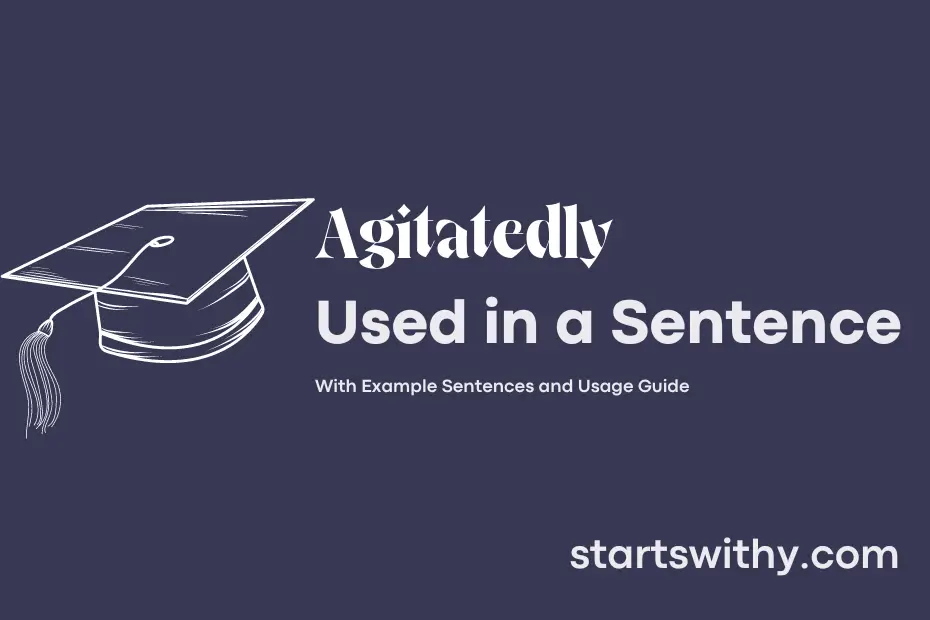Have you ever found yourself speaking or moving in a restless and flustered manner? This behavior can be described as acting “agitatedly.” When someone is agitatedly doing something, they are often visibly upset, nervous, or irritated.
Agitatedly is an adverb that adds emphasis to the action being performed, highlighting the state of agitation or restlessness in the person’s behavior. It implies a sense of franticness or unease, conveying a heightened emotional state.
7 Examples Of Agitatedly Used In a Sentence For Kids
- Agitatedly waving his hand, the boy tried to get the teacher’s attention.
- The puppy barked agitatedly when he saw the squirrel running by.
- She agitatedly jumped up and down, excited to show her new toy to her friends.
- The little girl looked around agitatedly for her missing teddy bear.
- He agitatedly asked for help when he couldn’t find his favorite book.
- The butterfly fluttered agitatedly when the children tried to catch it.
- The baby cried agitatedly when her mother left the room.
14 Sentences with Agitatedly Examples
- She agitatedly shuffled through her notes before the final exam.
- He agitatedly explained his point during the debate competition.
- The professor agitatedly paced back and forth while waiting for the projector to work.
- They agitatedly searched for their misplaced research papers in the library.
- The student agitatedly tried to fix his laptop before the online deadline.
- She agitatedly raised her hand to ask a question during the lecture.
- He agitatedly sorted through his class schedule during registration day.
- The group of friends agitatedly discussed their project ideas for the upcoming semester.
- The student agitatedly waited in line to submit his assignment before the deadline.
- She agitatedly scrolled through her phone to find the email from the professor.
- He agitatedly checked the results board after the exam.
- They agitatedly rearranged their presentation slides before the seminar.
- The room was filled with students agitatedly discussing the upcoming exams.
- The student agitatedly argued with the librarian over a late book return.
How To Use Agitatedly in Sentences?
Agitatedly means in a manner that shows extreme agitation or disturbance. To use this word effectively in a sentence, consider the following guide:
-
Identify when someone or something is displaying strong feelings of agitation, disturbance, or restlessness.
-
Use agitatedly before or after a verb to describe how the action is being performed. For example, “She paced agitatedly back and forth in the waiting room,” where agitatedly describes how she paced.
-
Combine agitatedly with adverbs or adjectives that emphasize the level of agitation. For instance, “He agitatedly shouted at the top of his lungs,” where agitatedly intensifies how he shouted.
-
Take note of the context in which the word is used to ensure it accurately conveys the intended meaning.
-
Practice using agitatedly in various sentences to become more comfortable incorporating it into your vocabulary.
For example: “The cat meowed agitatedly at the closed door, wanting to be let in.” This sentence effectively demonstrates how the cat is expressing agitation in a specific situation.
By following these guidelines and actively incorporating agitatedly into your writing or speech, you will improve your communication skills and enrich your language use.
Conclusion
In conclusion, the use of the keyword “agitatedly” in sentences denotes a state of excitement or anxiety. It portrays a sense of restlessness or impatience in the actions or speech of a person. For example, “She paced agitatedly back and forth in the waiting room” illustrates a sense of nervous energy. The adverb adds depth to the emotion being described, helping to paint a vivid picture of the individual’s demeanor.
Overall, sentences with “agitatedly” evoke a sense of tension or unease, highlighting the emotional state of the subject. By incorporating this word into writing, a more dynamic and expressive narrative can be achieved, allowing readers to better understand the character’s feelings and behavior in a given situation.



